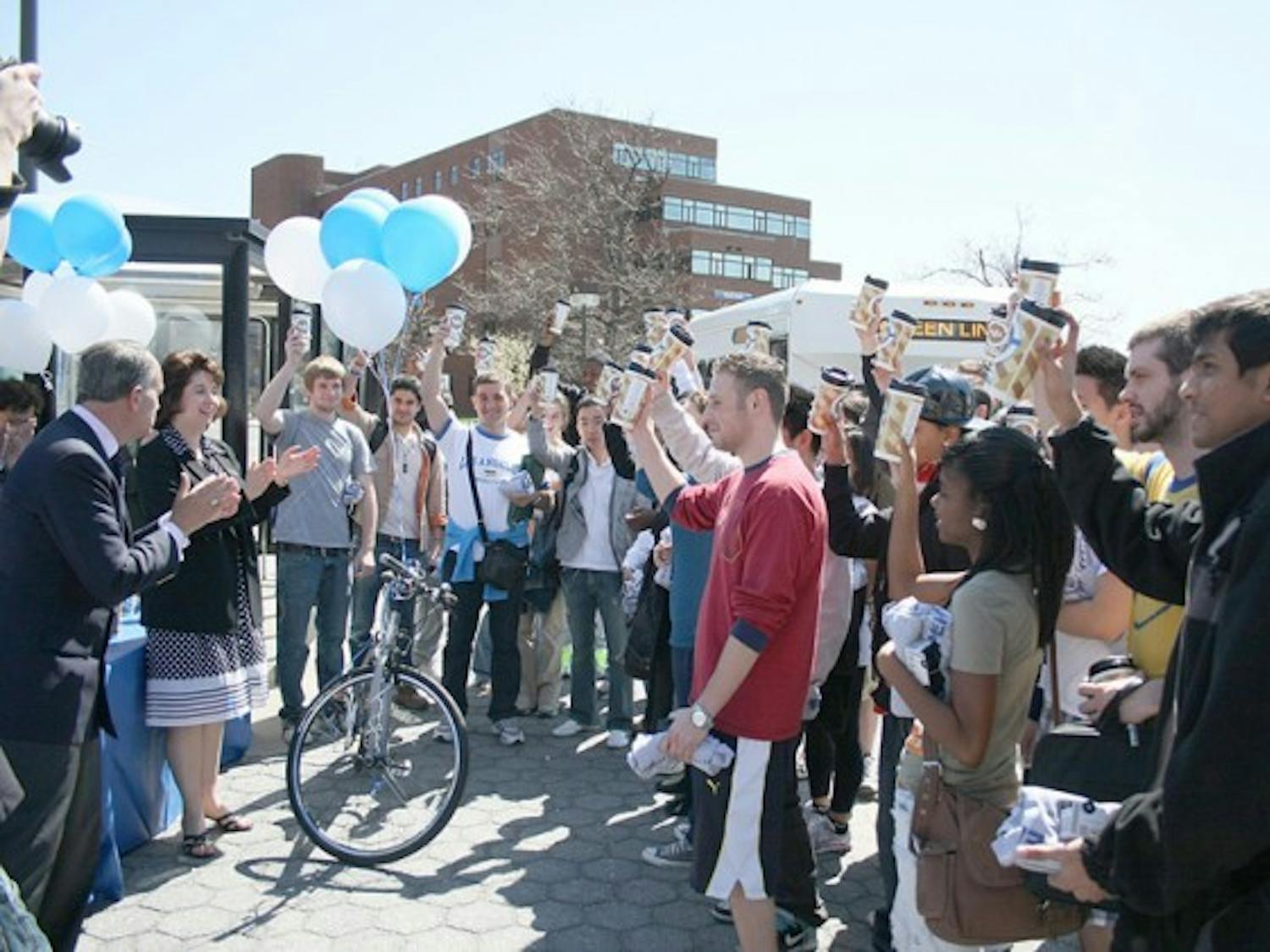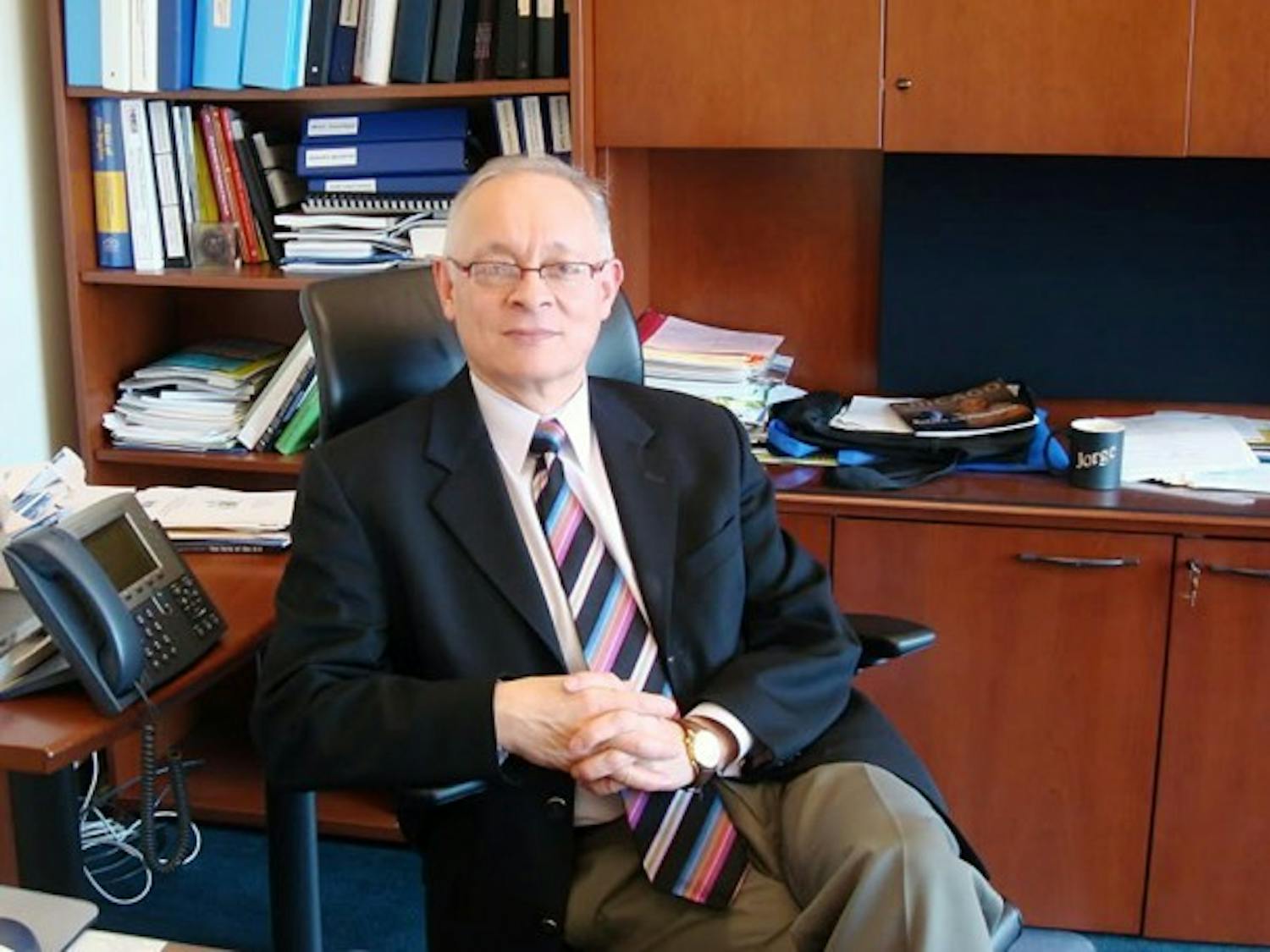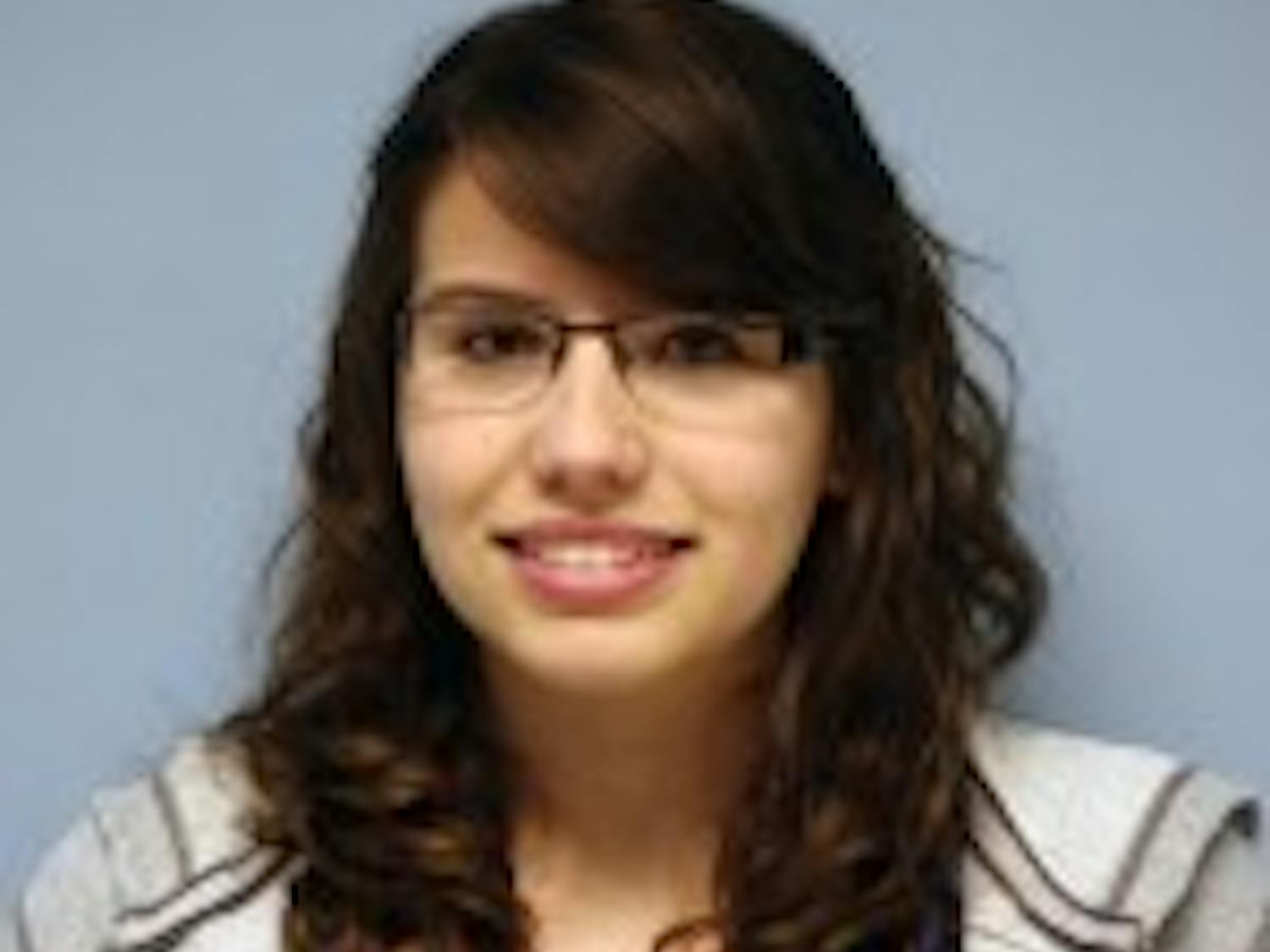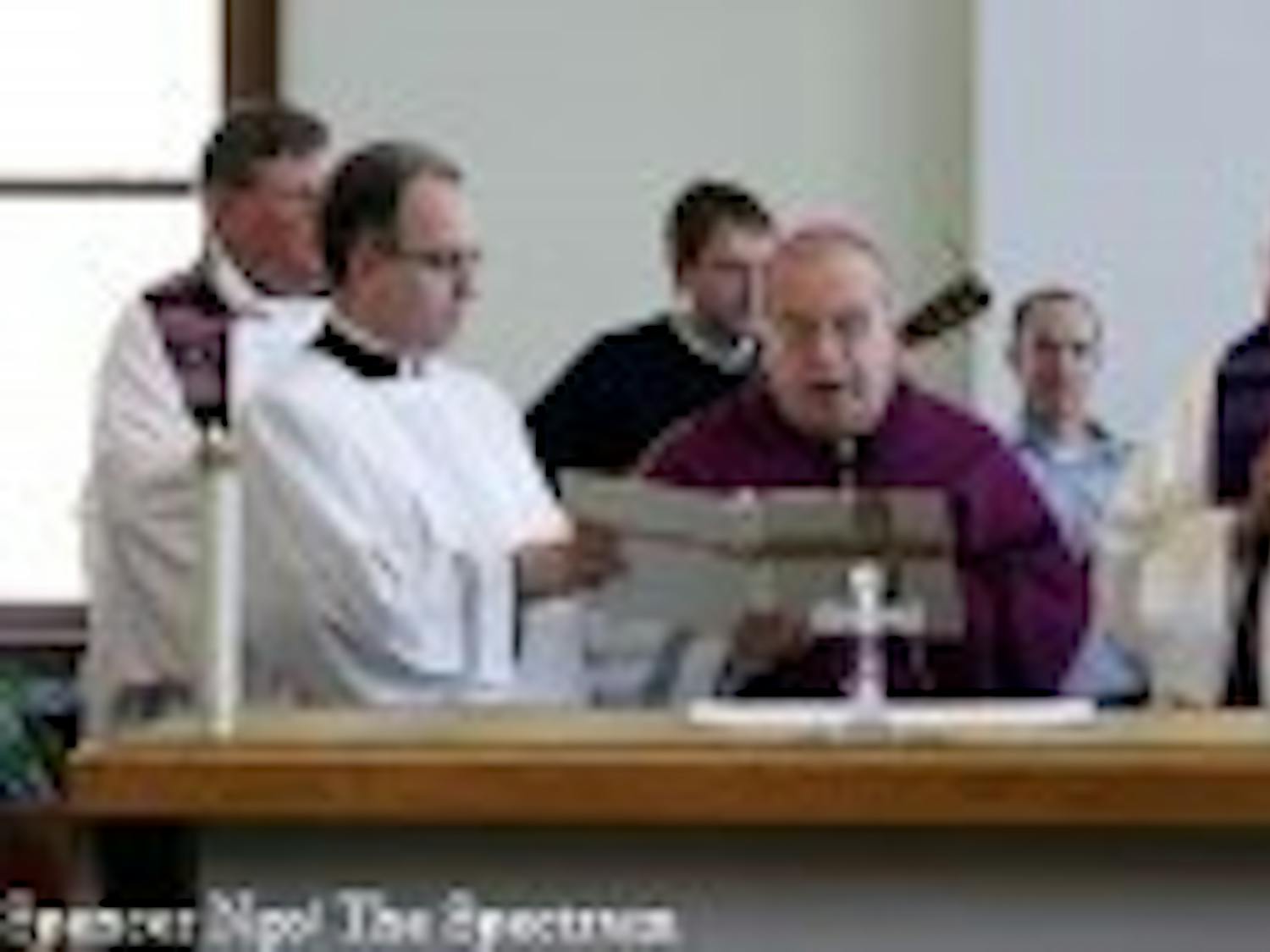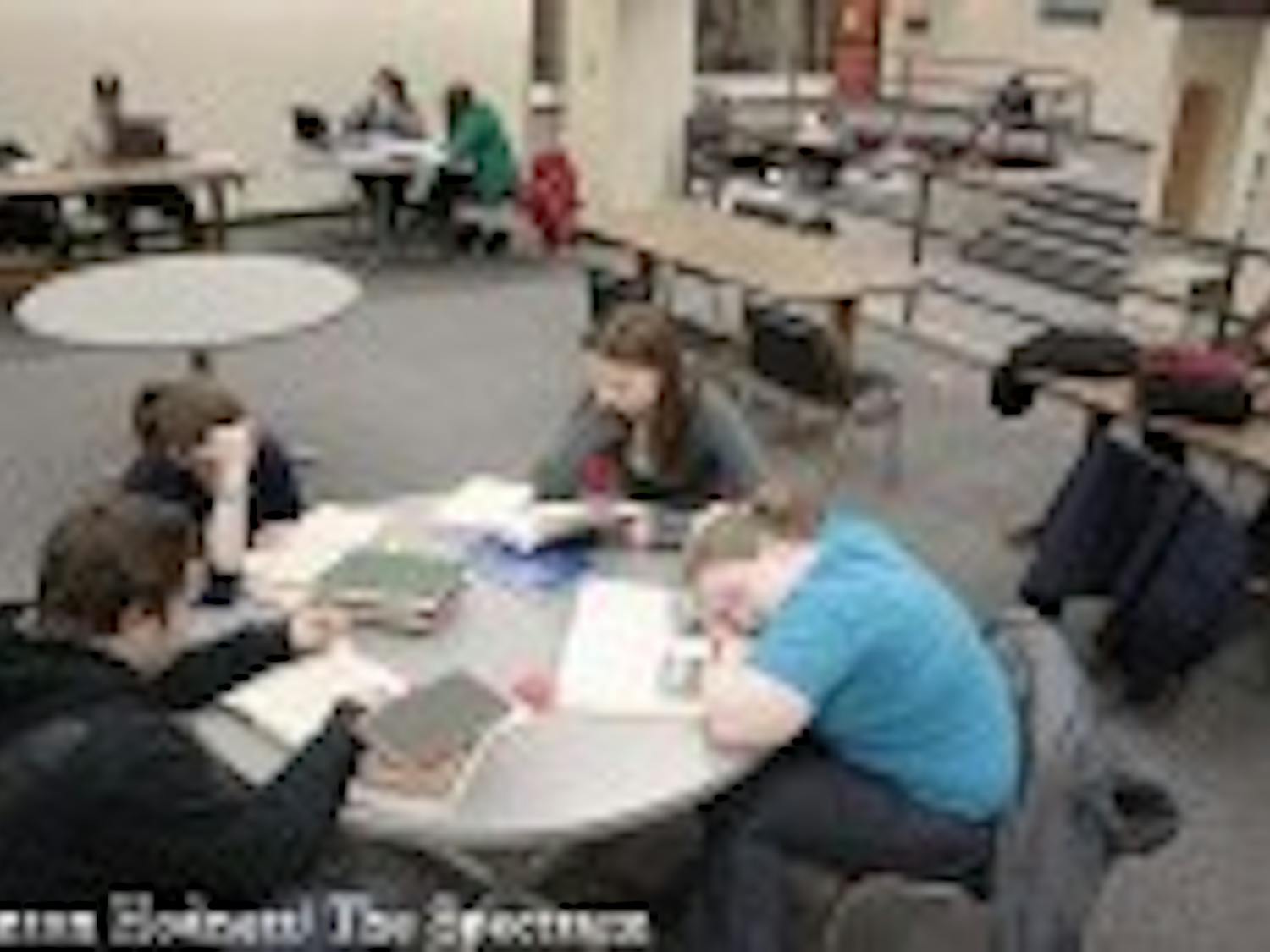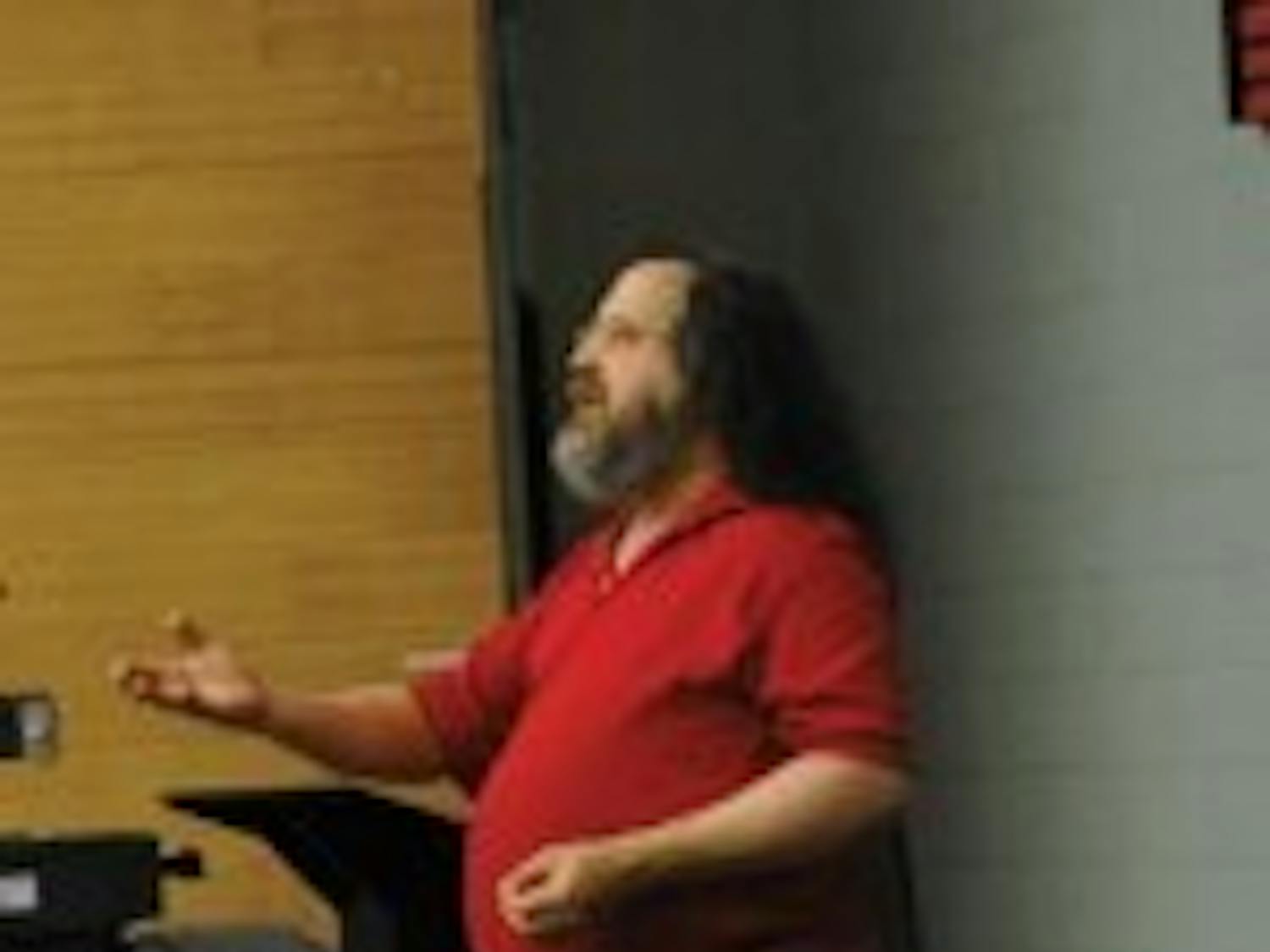Chelsie Hinckley
The past year at a glance
By Chelsie Hinckley | July 7, 2010In an effort to keep you well informed, and to help you avoid embarrassing conversations with upper classmen, The Spectrum has provided a compilation of the biggest news stories from the 2009-2010 academic year.
Construction noise angers students
By Chelsie Hinckley | Apr. 20, 2010Some students living in Fargo Quadrangle are petitioning for monetary compensation. They believe their living environment this year has been unsatisfactory. John Collins, a sophomore accounting major, and Fargo resident, is fed up with the University Residence Halls and Apartments. For the past year his dorm room, as well as others on his side of building one have dealt with the inconvenience of the noise from the construction on the future William R. Greiner residence hall. "The noise is not conducive to living," said Owen Eichensehr, a junior accounting major and Fargo resident. "50 to 60 people have had to put up with this all year." Angered by the constant interruptions, Collins decided to take action and form a petition to compensate Fargo residents for their disruptive living environment. He acts as a representative for the students listed the petition he created. "I had no idea the construction would be happening when I picked my room in March of last year. It wasn't until August that I found out," said Collins. "We are paying $5,928 a year for rooms just like everyone else but we are not getting the same product. We are owed some compensation." Collins isn't the only Fargo resident upset by the constant noise from construction. Close to 50 people have signed his petition for compensation so far and Collins believes this is the only way to get through to the residents hall about this irritating problem. "The only contact [with RH&A] prior to this petition was in the form of two e-mails, one of which I found offensive," Collins said. "They came up with ideas but never executed them, and when they did with the white noise machines, it was a joke." Collins is referring to a machine that releases noise from a fan, which is about four inches high and is the size of a bowl. "It just makes more annoying noise that doesn't cancel the noise from construction," Collins said. "They also gave us hours of all the study spaces available on campus." Eichensehr agrees with Collins that the white noise machines do not work. "[RH&A's] idea of how to fix the problem with the white noise machines was not well thought out. They don't work, and we were never informed they were available. You have to put in a special request to get one." This petition, residents hope, will prompt RH&A to monetarily compensate those students negatively affected by their living experience. Brett Wymer, a sophomore international business and finance major, feels as if compensation is necessary. "This consistently has been going on all year and has significantly affected the amount of sleep I've gotten," Wymer said. "The construction makes all kinds of ridiculous noise and it doesn't seem like anyone is helping us with this. I hope the university would do something to compensate us for this because it was been an awful experience and one of the worst sleeping and living environments." University Residence Halls and Apartments addressed this issue in an e-mail sent in December. In the e-mail, Joseph J. Krakowiak, director of URH&A, stated that his organization was "…concerned with the impact the South Ellicott construction project may have on [residents]" and that they would like to minimize the disruption students may experience." But, residents claim little to nothing has been done. URH&A Senior Staff Associate Kevin Ahuna met with Collins regarding this issue and according to Collins was "very understanding about the student situation," but could make no promises until Krakowiak returned to the office. URH&A declined comment to The Spectrum until Monday. E-mail: news@ubspectrum.com
UB Stampedes to 15 million passengers
By Chelsie Hinckley | Apr. 16, 2010The UB Stampede, the University at Buffalo's intercampus bus service, celebrated its 15 millionth passenger on Wednesday. The 15 millionth rider was calculated based off of the number of buses used in a day, taking into consideration the average number of passengers on board. All passengers on the winning bus received prizes as a token of appreciation for utilizing the university transportation. Many received T-shirts and UB campus dining and shops mugs. One random mug contained a plastic bicycle replica and the student who received the mug containing it won a new bike. "We are very pleased with the event," said Chris Austin, assistant director of parking and transportation services. "[We are also] pleased to highlight all the students and staff who utilize our public transportation." This celebration was meant to highlight the benefits public transportation has on the environment as well as to commend those who take advantage of it. "The UB Stampede has an enormous impact on the environment," said Maria Wallace, the director of parking and transportation services, in a press release. "It transports more than 20,000 passengers daily, saving 8,800 personal vehicle trips each weekday and eliminating more than 49 million pounds of carbon dioxide annually. The 15 millionth passenger campaign showcases UB's progress toward fulfilling our commitment to sustainability and climate neutrality." E-mail: news@ubspectrum.com
Jos?PI leaving for Indiana
By Chelsie Hinckley | Apr. 9, 2010As Vice President for Research Jorge V. José prepares to leave UB to become the Vice President for Research at Indiana University, he has mixed feelings about the move. He is excited for the new opportunity but feels bittersweet to be leaving his friends and colleagues. "It's a bigger challenge, it is an advancement professionally," José said. José joined the UB community in 2005 after leaving Northeastern University in Boston. He was initially interested in the University at Buffalo because of the UB2020 plan and is happy with how far the UB community has come in five years. "In the last five years there has been a cultural transformation [at UB] and there has been significant progress and changes with the planning of UB2020," José said. José is excited for his new position at Indiana University that, he hopes, will open more opportunities for his career. "It is a broader responsibility, here I am the vice president for research at one university in the SUNY system and there I will be the vice president for research for the whole system, and that is seven campuses, so I will oversee the research operation of several campuses at the same time," José said. His new position is similar to his position at UB in what it entails, but is spread out on a much wider scale. The research is dispersed throughout the campuses and deals with statewide issues rather than local problems. During José's five years at UB, research expenditures increased from $259 million to $350 million, a 33 percent increase. With this increase, José says he and his colleagues have been able to achieve a lot. Though this move is a good choice professionally for José he is sad to be leaving all the people he has built relationships with. "I am very happy living here and I leave with mixed feelings, because now I have a number of friends … but this is a mostly professional decision," José said. José is not alone in his move to a new university. Elias G. Eldayrie, the chief information officer at UB, is leaving for the University of Florida. While these loses to the UB community may seem like a negative thing, José believes they are a positive reflection on the university. "All universities hire professors from other universities and lose professors to other universities. We have an average of about 5 percent of our faculty leave and we hire many people from other universities too," José said. "It is a normal business practice … it is actually a good sign of having outstanding faculty that is attractive to people in other institutions." Though he is leaving UB, José plans to keep in close contact with the campus and feels invested with how UB2020 turns out. His last words of advice for the UB community are to support UB2020 as much as possible. "This is the best opportunity Western New York has of revamping the economy, revamping the image and revamping the standard of living in Western New York," José said. "It is very important that people don't loose track of the fact that we are going to find ups and downs in the process but as long as the derivative is positive this is really going to transform the region." E-mail: news@ubspectrum.com
Spotless Mind
By Chelsie Hinckley | Apr. 8, 2010Hands down one of the most interesting movies I have ever seen is Eternal Sunshine of the Spotless Mind, directed by Michel Gondry. Not only because I love Kate Winslet, but because the plot is so incredibly interesting. To sum it up without giving too much away, the couple (composed of Winslet and Jim Carrey) have a falling out, and both decide – through a series of twists and turns – to have each other erased from their memory permanently. This concept got me thinking: if you could erase a painful memory from your past, would you? I think this question is pondered a lot during hard times and suffering. You always wish you could erase that person who broke your heart, or that memory that hurts too much to remember. But would you actually go through with it? Throughout the movie the characters go on a journey through all of the times they have spent together, good and bad. This journey reveals a lot about human emotion. As human beings, I think we are always searching for a way to end bad times, get ourselves out of heartache, focus only on the things that make us happy and try to shun negativity and the things that make us upset. Hell, people spend millions of dollars on therapy to get over issues in their past as proof of this theory, but what if they could pay to have them completely removed? Do you think they would? For me, I think back to times in my life when I was at my lowest, times I wish I never had to experience again. But in a way, I believe the bad times are what characterize you as a person. The struggle to persevere through the tough parts of life and get through it with your head held high is what makes you a better person. While you may not believe it at the time, it really will pay off in the end. "Without sadness we would no know joy" is a saying my mom used when I was feeling like I just couldn't carry on anymore. I believe in that statement whole-heartedly. Sure, it might be easier to just erase all the lost friendships and the heartache we have felt in life, but would you be willing to trade all the good times too? Better yet, when you make it through the bad times, doesn't it make you appreciate the good times that much more? I know it works that way with me. The characters in Eternal Sunshine of the Spotless Mind realize that you never really know what you have, or how important memories are until they are moments from being sucked away. Cherish your memories, good and bad, because they are what make you who you are. While you might wish you could erase someone, or something, from your mind today, it may come back to help you in the future even if for nothing more then making you a stronger person in the long run. E-mail: chelsie.hinckley@ubspectrum.com
UB awarded for volunteer work
By Chelsie Hinckley | Mar. 28, 2010Third time's a charm. UB has been named to the 2009 President's Higher Education Community Service Honor Roll for the third year in a row. This achievement is the highest federal recognition a college or university can receive for its commitment to volunteering, service-learning and civic engagement. The office of Student Leadership and Community Engagement is excited about this award and views it as a reflection of hard work. "[This award is] well deserved," said Terri Frysh, the community engagement coordinator for the Center for Student Leadership and Community Engagement (CSLCE). "The school does a lot to engage students in the community and the recognition will hopefully bring more awareness to our office and the opportunities available on and off campus for volunteering." The CSLCE was recognized in the award specifically for its "Saturdays of Service" program. This program, according to the Center for Student Leadership and Community Engagement Web site, is a monthly service opportunity for students to volunteer and help serve the local Buffalo and WNY Community. Students volunteer on a designated Saturday from 9 a.m. to 2 p.m. at a number of locations throughout the community. "Our office has an online posting of volunteer opportunities on or off campus that range from one-time opportunities to ongoing ones, and we offer specific programs through our office, such as Saturdays of Service and Habitat for Humanity," Frysh said. Among the programs recognized was UB School of Management's free tax preparation service. Student volunteers provided this service for about two months to families in the Buffalo area who make less than $49,000 a year. According to a press release, this program prepared 676 tax returns, adding up to a total of $640,000 in tax refunds to the Buffalo community. Ryan Linden, a junior accounting major and site coordinator for the free tax service, takes pride in the work this program has done for the Buffalo community and encourages others to get involved. "Everything that this school gives you, you have to give back. Through this program, I have learned how to file my own taxes while getting to help those in need, and it is a very rewarding experience." The program had its biggest turnout this year with 200 volunteers. It is sponsored by the Beta Alpha Si business frat and the Volunteer Income Tax Assistance Program, VITA. Included in the other noted programs here at UB were UB's Lighthouse Free Medical Clinic; the Science, Technology, Engineering and Mathematics (STEM) summer program; and Community as a Classroom, a project of the UB Center for Urban Studies. The Corporation for National and Community Service, which administers the annual Honor Roll award, recognized more than 700 colleges and universities for the 2009 honor. The recognition process consists of a series of selections based off of factors that include a percentage of students involved in service activities and incentives offered by the university for academic service-learning courses. According to a press release, approximately 4,700 students, as well as hundreds of faculty and staff, participate in community service activities at UB. E-mail: news@ubspectrum.com
Joyful beginning for new Campus Ministry Center
By Chelsie Hinckley | Mar. 3, 2010Father Patrick Keleher's dream was to have one place where UB students, staff and community members could come together and celebrate their Catholic faith.
Learning for life
By Chelsie Hinckley | Feb. 26, 2010Based on a new proposal from the university, general education requirements are currently being looked at in order to create a more well-rounded curriculum for all majors. Formed in March 2009 by UB's Provost and Faculty Senate, the General Education Task Force has made revamping the general education requirements at UB its goal, hoping to make them more interesting and beneficial to the student body as a whole. The task force was formed for the purpose of 'taking a holistic view of the general education program, focusing on its underlying philosophy, intellectual purposes, and educational mission; considering the opportunity to create a new signature program for the University at Buffalo while complying with the existing SUNY general education requirements; and defining the role of a new general education program within the mission of the University at Buffalo at large' according to a proposal. Andreas Daum, associate dean in the College of Arts and Sciences, said the task force was formed to take a fresh look at the existing system set in place for general education requirements. 'The existing general education requirements are a heavy burden on the shoulders of students,' Daum said. 'We hope to fill the courses with meaning and make them more appealing.' In the proposal, the task force states that it hopes to make general education at UB more exciting, distinctive, and more responsive toward students' needs. The biggest challenge Daum says the task force faces is 'how … [to] prepare our students for the real world while still meeting the requirements set in place.' They hope to do so with input from the UB community. 'I think courses that apply to real life would be more beneficial,' said Nicole Yehezkel, a freshman international business major. 'I wouldn't mind taking more general education courses; some of the required ones are pretty interesting and I would have taken them on my own.' Other students feel that the general education requirements here at UB are too restrictive and don't apply to their major of study. Katie Leavitt, a doctoral candidate, expressed her aggravation about general education courses. 'I have to take a science class to meet my gen. ed., [so I chose] astrology. I'm working on my doctoral in child counseling and psychology and don't need the class,' said Leavitt. 'I feel like it is a waste of my money and time.' Joe Randel, a freshman civil engineering major, agrees. 'I don't want to take more gen. eds. I am an engineering major and all of my course time is full, so I don't have time in the four years to fit in more classes,' Randel said. The task force plans to rethink the purpose of general education courses and redirect them to the 21st century, not necessarily add any more courses to the curriculum. Some proposals stated in the 'UB Core Curriculum: Learning for Life' report include promoting basic skills and competencies such as math, science, English, technology and history. Instilling ethical reasoning, improving global perspectives and increasing the breadth of foreign language studies were also focuses. While this report lists proposals of what the task force hopes to achieve, nothing is final and all is open for debate and discussion. The task force hopes to use this semester as an opportunity to receive feedback from the campus community. 'This report is not the end point, it is the beginning,' Daum said. Anyone interested in contributing their ideas or input to the general education task force can contact the group at 716-645-6003 or ubgened@buffalo.edu. E-mail: news@ubspectrum.com
"Free software, free society"
By Chelsie Hinckley | Feb. 26, 2010Richard Stallman spoke to an eager crowd of UB students Monday night, bringing to them his message about free software and explaining what he feels are the evils of copyright law. Stallman is well known for his position as the founder of the GNU Project and the Free Software Foundation. He is a long-term activist for free software and advocates against corporations who, he believes, stretch the copyright laws and software patents. He presented in Norton Hall on Monday about his first passion – free software. Free software, as defined by Stallman, is as equal a right as free speech, and deserves the same attention and advocacy. It is not 'free' as in without cost to the consumer, but as a matter of liberty. The GNU Web site states that 'to understand the concept, you should think of ‘free' as in ‘free speech,' not as in ‘free beer.' Stallman also states that free software has many layers to it and that four key freedoms should be applied to any software worth using. The first freedom, referred to as Freedom 0, is the freedom to run the program for any purpose. Freedom 1 is the freedom to study how the program works and adapt it to the user's needs. Access to the source code is a precondition for this. Freedom 2 is the freedom to redistribute copies so users can help their neighbors. The final freedom, Freedom 3, is the freedom for users to improve the program and release those improvements to the public, so that the whole community benefits. Stallman applies these 'freedoms' to software that students use every day and warns those who do not follow these guidelines that they are at risk. 'Windows is extremely malicious software and allows the owners of that corporation to spy on you,' Stallman said. 'Apple is almost just as evil.' He describes these evil features as Digital Restrictions Management and says that these products and corporations infringe on users' freedoms. His solution for this 'infringement' is to just not use the products at all. Justin Kimber, a freshman psychology major, disagrees with this statement. 'I think that is [greatly] over-exaggerated,' Kimber said. 'I understand that there may be a privacy issue, but I think that the consumer should be aware of what they are buying and getting into with the product. I have a Mac and have never had a security issue. I find the features easy.' Stallman told his audience that 'you should never touch any product that is designed to attack your freedom,' including any encrypted item, such as a DVD or CD, and to stay away from e-books and online bookstores such as Amazon. He says these Web sites and e-books have the power to record who accesses which books and to keep a record of personal purchases. This is problematic, according to Stallman, because it infringes on privacy and freedom. He says that he would 'never purchase or accept as a gift an encrypted DVD,' and tries to set an example for those following him. To give an example of companies that he feels are 'evil,' Stallman referred to Disney and its copyright extension on Mickey Mouse. He claims that this is a perfect example of a company bending copyright law to its own needs and ignoring the freedoms of the consumer. Daniel Krysak, a graduate student in planetary geology, has been following Stallman for a while. 'I support him entirely. I've been a free software advocate since I was a kid,' Krysak said. 'I think everyone should be educated on it, and because of the topic, it won't be covered in mainstream media.' 'It gave me a new perspective and his presentation was interesting,' said Alisha Armstrong, a graduate student in media studies and sociology. 'I learned stuff I wasn't aware of.' E-mail: news@ubspectrum.com




